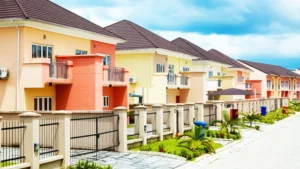
By David Akinmola
The number of rental households in Lagos remained stagnant at 1.38 million between 2016 and 2025, even though the city added 750,000 new households during the same period.
This was disclosed in The State of Lagos Housing Market Vol. 3 Report, which examined the city’s housing demand, supply, and affordability challenges.
According to the report, Lagos’ population rose from 21 million in 2016 to a projected 24 million in 2025.
With an average household size of four, the number of households expanded from 5.25 million to 6 million in less than a decade. Yet, the share of households that rent declined from 83% to 77%, while the absolute figure remained unchanged at 1.38 million.
“The housing deficit in Lagos remains a significant urban challenge, with the gap between demand and supply widening between 2016 and 2025. In 2016, Lagos had an estimated population of 21 million people and 5.25 million households based on an average household size of four.
By 2025, this population is projected to grow to 24 million, resulting in about 6 million households, an increase of 750,000 households in less than a decade.
“Housing demand naturally mirrors this growth, rising from 5.25 million in 2016 to 6 million in 2025. While the percentage of households that rent has declined from 83% to 77%, the absolute number of renter households remains static at 1.38 million, indicating a possible plateau or data misalignment in the figures,” the report read in part.
The report suggested that the stagnant rental numbers may reflect affordability pressures, forcing many families into informal housing, overcrowded units, or self-built homes rather than formal rentals.
Housing demand also climbed during the review period, from 4.36 million units in 2016 to 4.62 million units in 2025. Meanwhile, supply improved from 1.42 million units to 2.58 million units.
Despite this progress, the overall housing deficit in Lagos widened to about 3.4 million units in 2025, made up of 0.62 million units in quantitative shortfall and 2.78 million units in poor-quality housing.
The report further noted that Lagos requires 227,576 new homes annually to keep pace with population growth and replace dilapidated stock. However, actual delivery remains far below this benchmark, compounding the city’s housing crisis.
Earlier story published in 2024 noted that house rents in Lagos had skyrocketed by more than 100% in just four years, far outpacing household incomes that largely remained stagnant.
The report highlighted how families were forced to cut back on essentials, relocate farther from workplaces, or endure overcrowded housing in the face of escalating costs.
Residents shared personal stories: a two-bedroom flat in Oke-Afa Ejigbo rose from about N400,000 to over N1.1 million between 2020 and 2024; in Ojodu Berger, rent for a similar unit climbed from N350,000 to N1.3 million; while in Ogba, prices doubled from N500,000 to N1 million. These increases contrasted with salaries that barely moved, sometimes rising just 10% over the same period.
Experts attributed the surge to in-migration, gentrification, improved infrastructure in suburbs, and inflation-driven construction costs, but also flagged arbitrary rent hikes by landlords. The Lagos government responded with promises to enforce monthly rental payments and curb exploitative practices.







